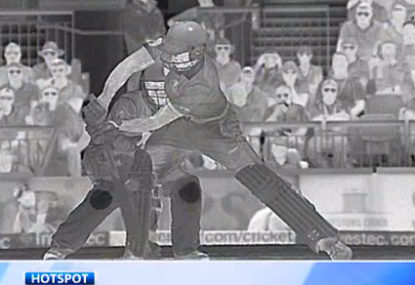Aussies leapfrog India in rankings despite neither team playing, Starc returns to form in IPL
Australia have reclaimed top spot in the ICC's Test rankings, replacing India. Despite not playing since winning 2-0 in New Zealand in March, Pat…

The DRS, it needs to be made clear, was never, ever going to be used ‘just to eliminate howlers’.
What batsman, certain he hasn’t hit the ball, is going to meekly accept the umpire’s raised finger just because he nearly hit it?
What bowler, knowing the batsman nicked it, is going to forgo a wicket because it wasn’t that obvious?
A batsman given out wrongly is just as out whether the decision was close or a ‘howler’; a bowler denied a scalp has been just as wronged whether it was an easy call or a difficult one.
And on such decisions do wins and losses, and cricketing careers, hang.
Nobody is going to fail to use the technology at their disposal out of an altruistic commitment to the imaginary ‘no-howlers’ principle. If we want it to just eliminate the wildly incorrect, we should just leave it up to the third umpire to intervene or not on his own – the players sure as hell aren’t going to stick to that ‘rule’.
Also, every cricket commentator on earth keeps saying “howlers” and it’s getting really annoying.
No, it’s not the use of the DRS to attempt reversals of close calls that bugs me: it’s the strategy.
As I said, DRS ain’t for howlers, it’s just to get decisions right as often as possible, or should be. Which is fine. It’s a noble aim. It’s just a shame it seems to be not that good at that.
But what I really object to is the strategy.
Cricket is many things, but one thing I always thought it was is a contest of cricketing skills. Batting, bowling, fielding, if you get my drift.
Tactics? These have to do with field placements, batting orders, bowling changes, choices on when to declare, whether to attack or defend, chase a total or play for a draw, and so on.
There is something infinitely depressing about the idea DRS use is now a part of a team’s strategic kitbag.
After the first Test, it seemed many people were less critical of Aleem Dar for missing Stuart Broad belting the ball directly to slip than they were of Australia for ‘poor DRS use’.
But all the Australians had done was call for reviews when they thought the umpire was wrong. And forget talk of howlers, that is the point of DRS. And it’s the whole point, and nothing but the point.
Sure, that cost Australia, but the idea of suffering a shocking call like that one – and those on-field calls shouldn’t happen anyway if the ICC is hiring umpires with even the merest shred of competence – is less sad to me than the idea that DRS use is now a ‘skill’ to be honed and practiced.
I don’t want teams getting together to practise their DRS technique. I don’t want the DRS to sit beside the bat and the ball as tools of the player’s trade. I don’t want instructional manuals to be put out letting kids know how to make the most of the DRS.
If a DRS is to be there, I want players to use it when they think the umpire is wrong, and to not use it when they think he’s right, and leave it at that.
I don’t want it to be the subject of plotting and planning and strategic decisions. That is just lame.
What’s more, what you’re going to get is genuinely going to go against the ‘spirit’ of the DRS. And that’s players second-guessing and rejecting the DRS when there actually has been a mistake.
“Have to save the reviews, won’t appeal,” they’ll think. And like Chris Rogers when he wasn’t out, and like famed DRS-incompetent Shane Watson when he had the batsman plumb, they’ll let slip the advantage they should have had.
And from trying to overturn ‘non-Howlers’, we’ll go to not trying to overturn actual howlers. And the whole thing will be ridiculous.
And from there, it’s just a short step to putting silicon tape on your bats to prevent the DRS working at all.
Because once you start thinking of the umpires as a system to be gamed, you’re going to look down every avenue of opportunity.
And so, we’ve reached a sad day in cricket. And it does, I think, make one despair.